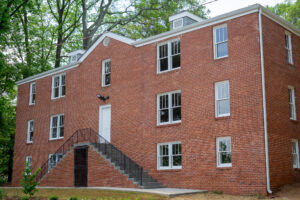On Friday, December 19, the Westside Future Fund (WFF) welcomed community members, partners, and neighbors to the monthly Transform Westside Summit for a meaningful conversation centered on education, opportunity, and the future of Atlanta’s historic Westside. This month’s program featured Dr. Bryan Johnson, Superintendent of Atlanta Public Schools discussing building brighter futures for our students.
WFF President & CEO John Ahmann opened the Summit by welcoming attendees and sharing updates on the organization’s Home on the Westside program. Designed to prioritize high-quality, affordable housing for those who live, work, and learn on the Westside, the program continues to offer both rental opportunities and affordable single-family homeownership options.
Ahmann shared a video highlighting two new multifamily developments on Echo Street and Boone Street, which together will provide 57 affordable rental units to the community. He also spoke about the single-family homes currently available for purchase and emphasized the opportunity for down payment assistance, a critical tool in helping Westside residents achieve stable, long-term homeownership.
This month’s Summit featured a unique and powerful community-led devotion. Gospel quartet Tiny Foster & Dem Saints offered music that grounded the room in fellowship and shared experience, reminding attendees of the unifying power of faith, culture, and connection.
Following the devotion and fellowship, Ahmann welcomed Dr. Bryan Johnson, Superintendent of Atlanta Public Schools, for a moderated discussion titled “Building Brighter Futures: Dr. Bryan Johnson’s Vision for the Booker T. Washington Cluster.”
Building Brighter Futures
Dr. Johnson shared his deep belief in what is possible when vision, innovation, and community come together in service of students, and the conversation began with a focus on academic achievement within the Booker T. Washington Cluster.
“We are making a deep investment in the Washington Cluster explicitly,” Dr. Johnson shared. “We’re providing more options for families and students. We’re being intentional about positioning students for the future.”
Reflecting on his early days at Atlanta Public Schools (APS), Dr. Johnson spoke about the historic and cultural significance of Booker T. Washington High School:
“I had the privilege of starting during the 100th year, so there were a lot of special moments… There was this recognition of the significance of Booker T. Washington High School to the city, and the community, and frankly the nation—the legends that have walked the halls, and the impact that they have had on the city and the country. You recognize the importance it has for the community.”
“Because of that history, because of that excellence,” he added, “we’ve got to make it all that it can be.”
Dr. Johnson emphasized APS’s commitment to making the cluster a destination—not only for the surrounding neighborhoods, but for the entire district. “We want parents to choose Atlanta Public Schools,” he said.
Family Engagement, Community Partnership, and Equity
The discussion then explored meaningful family engagement and the role schools play in building strong relationships with parents and caregivers. He acknowledged that families come from many different circumstances and emphasized the responsibility schools have to meet them where they are.
“Our vision is that folks see the school as an extremely welcoming place,” he said. “A place that no matter if you earn a million dollars, or a thousand, or no dollars a year… you know how to access and engage in your child’s learning.”
When asked how community partners like Westside Future Fund, nonprofits, and businesses can support this vision, Dr. Johnson highlighted the importance of long-term student success.
“As important as it is to provide coats and backpacks and all those things—which we’re so grateful for—the most important thing we can do is position students to be successful post-graduation,” he said. “Teaching students to read, think critically, and understand how to navigate social skills—that’s how we break some of the generational challenges that have persisted in Atlanta and across the country.”
Equity remains a central focus of APS’s work. “We’re unapologetic about making sure no matter where you are, you have access,” Dr. Johnson shared. “We’re investing strategically.”
Looking Ahead with Hope
When asked what gives him the most hope for the future, Dr. Johnson’s answer was immediate: the students.
“The students give me the most hope,” he said. “This generation is different—and it’s incumbent upon us to figure out how to meet them where they are.” With more information and opportunity available earlier than ever before, he emphasized the importance of building strong academic foundations while continuing to adapt to students’ evolving needs.
“The kids are brilliant,” he added. “The more we can expose them to opportunities, the better positioned they’re going to be.”
Dr. Johnson encouraged ongoing dialogue and accessibility, inviting community members to reach out with follow-up questions. The audience members—many of whom are parents and grandparents—asked questions on topics from AP course access and literacy improvement, to facilities planning and skill-based learning. Throughout the discussion, Dr. Johnson reaffirmed his unapologetic commitment to recognizing current gaps while making intentional, meaningful improvements across the district.
The summit ended with a rousing rendition of Joy to the World. It served as a joyful reminder that together, through partnership, vision, and shared commitment, we continue working toward brighter futures for the Westside.
Missed the event? Watch the full December Transform Westside Summit on YouTube.









